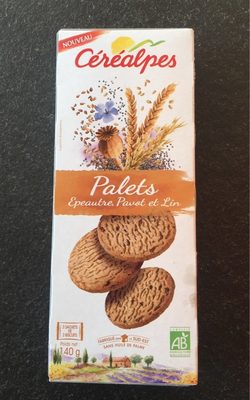palets epeautre pavot et lin - Cerealpes - 140 g
This product page is not complete. You can help to complete it by editing it and adding more data from the photos we have, or by taking more photos using the app for Android or iPhone/iPad. Thank you!
×
Barcode: 3259011189472 (EAN / EAN-13)
Quantity: 140 g
Brands: Cerealpes
Labels, certifications, awards:
Organic, EU Organic, No palm oil, AB Agriculture Biologique

Countries where sold: France
Matching with your preferences
Environment
Packaging
Transportation
Labels
Report a problem
Data sources
Product added on by kiliweb
Last edit of product page on by roboto-app.
Product page also edited by autorotate-bot, openfoodfacts-contributors, teolemon, yuka.YVBBOFRxY21nY0ZWaWZNNTdqanQrY0pVL0o2alUwT3ZPZUFoSVE9PQ.
If the data is incomplete or incorrect, you can complete or correct it by editing this page.










